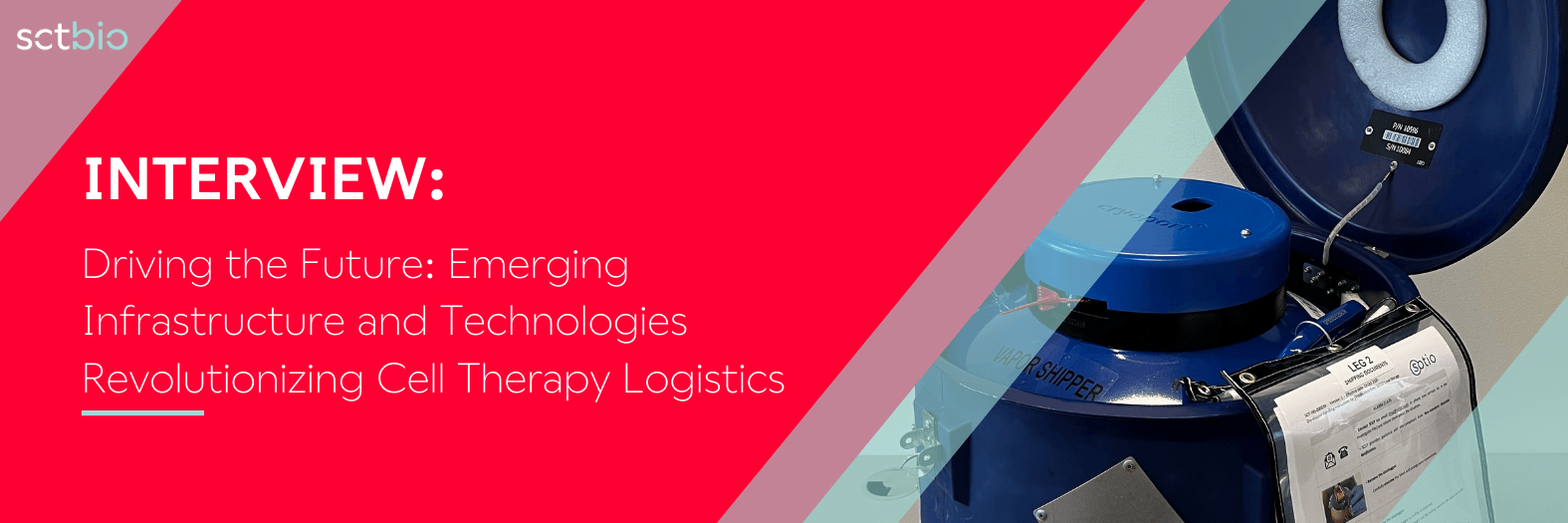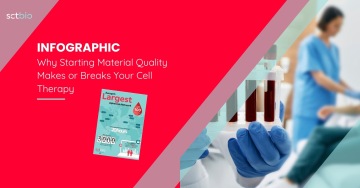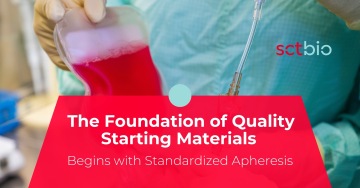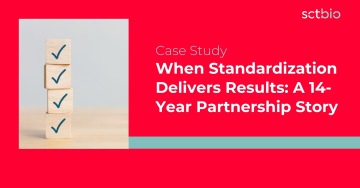
Driving the Future: Emerging Infrastructure and Technologies Revolutionizing Cell Therapy Logistics
In this interview, Martin Pavek, Chief Operating Officer at SCTbio, discusses the unique challenges and complexities of cell therapy supply chains. Drawing from his extensive experience across biotech, pharma, and FMCG sectors, he discusses critical considerations for clinical trials and commercial distribution, the evolving role of CDMOs, and how emerging technologies and infrastructure are shaping the future of cell therapy logistics.
1. You have a breadth of experience across biotech, pharma and FMCG. From your perspective, what are the specific complexities for cell therapy? Are there any considerations that are commonly overlooked?
The whole supply chain of cell therapies is very complex and very specific. There are different transport temperature ranges and time sensitivities in the beginning of the process when the cells are collected and transferred to manufacturing and then after the final treatment is produced and transported to the patients.
Developers often focus on the cost of offered services but it’s not just the cost that’s important. During the selection process I would recommend a thorough market evaluation of potential partners to understand if all promoted services are actually available, achievable, and that the provider is open and transparent. It’s crucial in this type of partnership to ensure open communication channels and flexibility.
What’s really important and should not be overlooked, from my experience, is the selection of experienced logistics partners – that is the key for successful cell therapy supply chain.
2. What is the role of a CDMO in the supply chain and logistics of
a. clinical trials
b. approved cell therapies?
Experienced CDMOs play an important role in the supply chain of clinical trials. Knowledgeable CDMOs can offer supply chain services of already approved, experienced logistic providers used by their other clients in different studies. This can be one of the biggest advantages for new CDMO clients so that they can get quick and approved solution for their logistics. This is all backed up with strong logistics software, ideally proprietary to the CDMO, to ensure traceability and robustness of the supply chain.
However, finding the right partner isn’t always easy. During selection process I would ask for several mock shipments to understand if that partner is reliable and can provide flexible solutions in every situation. For instance, at SCTbio, we run several test shipments, or we use new providers only for sample shipments to see if we can smoothly cooperate before a more in-depth partnership is established.
From a ‘small CDMO’ point of view, it’s very important to establish open communication channels that are part of everyday cooperation. In this case when every second shipment has different size of packaging, transport conditions and destination is smooth and fast communication key for successful cooperation.
3. What are the pros and cons of decentralized or near-patient manufacturing from a supply chain point of view?
The pros of decentralized manufacturing are mainly in lower costs and shorter lead times between hospital and manufacturing. Among the cons I would highlight the high cost you have to pay for trained people and additional equipment you need in case of decentralized manufacturing, which involves multiple sites.
I can speak to challenges that appeared with Brexit while shipments to UK in the past were easy & smooth. Now we are facing obstacles in the UK where each shipment from the EU must have UK QP oversight that is adding again not only complexity but as well additional cost to each shipment to that country from EU.
4. As the industry moves towards more approvals of autologous therapies and larger patient populations, do we have the supply chain infrastructure to support this?
Autologous therapies have been in development for more than 10 years and over that time logistics companies have had a time to prepare capacities for this type of supply chain. There are logistics companies in the market today that are able to support and cover supply chain needs of autologous therapies with lager patient populations now.
5. How important is the role of technology in enhancing supply chain visibility and efficiency?
Technology plays a critical role in enhancing supply chain visibility and efficiency, especially around temperature monitoring and time-sensitivity of critical deliveries. Current technologies allow 24/7 monitoring of shipments and help deliver critical shipments to the right destination on time without any issues like a loss of tracking.
It’s necessary to maintain temperature control over the whole transport chain and assures regulators and all parties involved that transport went as requested and was fully under control across the whole shipment and supply chain.
Patient safety is paramount, and in the supply chain and transport world, we have to follow GDP requirements to ensure that the quality and integrity of medicines being shipped are maintained throughout the supply chain. These new monitoring technologies are the tools that help us achieve compliance and more transparent, reliable results.

About Martin Pavek, COO, SCTbio
Martin brings over 20 years of extensive experience in supply chain management and logistics across pharmaceutical, biotech, and FMCG industries. Prior to his current role, he served as Supply & Operation Services Manager both here at SCTbio and SOTIO, where he developed deep expertise in cell therapy logistics and operations.
His career includes leadership positions at global companies including Reckitt Benckiser, Kimberly-Clark, Colgate Palmolive, and Procter & Gamble, where he managed complex supply chain operations across multiple European markets. Martin holds a Master’s degree in business administration with a focus on Logistics from the University of Economics in Prague.
Read more about our supply chain network and partnership with Cyto-care to improve cell therapy cryopreservation and logistics capabilities in Europe.
To learn more about SCTbio's cell therapy supply chain solutions and how we can support your development program, get in touch
Related Resources
This interview is part of our ongoing to sharing knowledge and experience. Dive deeper into the strategic considerations shaping the future of cell therapy development:


